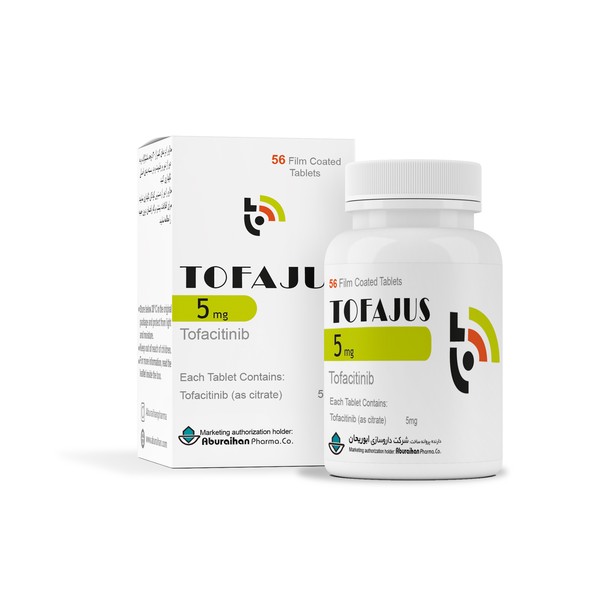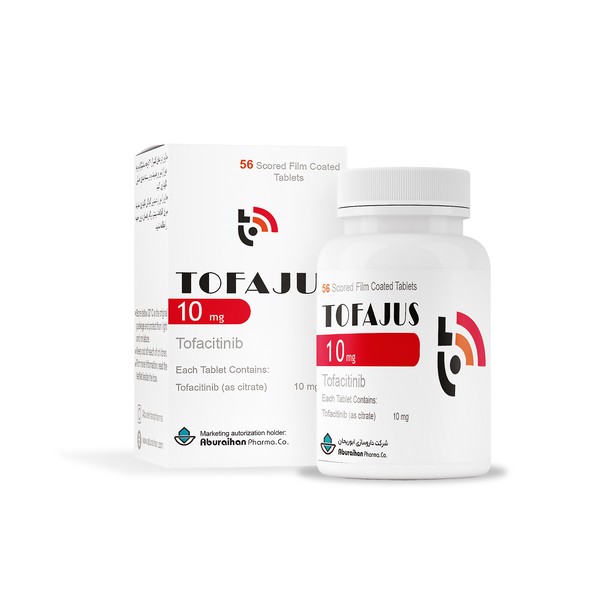Tofajus®
Tofacitinib
Film-coated tablet 5, 10 mg
Tofacitinib 5 mg is prescribed to you for treatment of:
- Rheumatoid arthritis (Moderate-to-severe active rheumatoid arthritis in patients who have had an inadequate response to or are intolerant to one or more disease-modifying anti-rheumatic drugs; as monotherapy or in combination with methotrexate).
Mechanism of Action:
Janus-associated tyrosine kinases (JAK1and JAK3) inhibitor
Method of Administration:
This medicine is provided to you and supervised by a specialized doctor who knows how to treat your condition.
Always take this medicine exactly as your doctor has told you, the recommended dose should not be exceeded.
Check with your doctor or pharmacist if you are not sure.
Rheumatoid arthritis
- The recommended dose is 5 mg twice a day.
- If your treatment is interrupted, your doctor may decide to restart your treatment.
- Try to take your tablet at the same time every day (one tablet in the morning and one tablet in the evening).
- You can take Tofacitinib with or without food.
- Your doctor may reduce the dose if you have liver or kidney problems or if you are prescribed certain other medicines.
- Your doctor may also stop treatment temporarily or permanently if blood tests show low white blood cell or red blood cell counts.
Hepatic impairment
- Avoid in severe impairment. Reduce dose to 5 mg once daily in moderate impairment.
Renal impairment
- Reduce dose to 5 mg once daily in severe impairment.
Children and adolescents
- Tofacitinib is not recommended for use in children or adolescents under 18 years of age.
Notes
Contraindications:
You should NOT be given Tofacitinib tablet if you:
- are allergic to Tofacitinib or any of the other ingredients of this medicine.
Signs of allergic reactions include: chest tightness, wheezing, severe dizziness or light-headedness, swelling of the lips, tongue or throat, hives (itching or skin rash).
- have a severe infection such as bloodstream infection or active tuberculosis
- have been informed that you have severe liver problems, including cirrhosis
- are pregnant or breast-feeding
- have absolute lymphocyte count less than 750 cells/mm3
- have absolute neutrophil count less than 1000 cells/mm3
- have haemoglobin less than 9 g/dL
If you are not sure regarding any of the information provided above, please contact your doctor.
Interactions:
Please tell your doctor or pharmacist if you are taking or have recently taken any other medicines, including medicines obtained without a prescription. This is especially important with the following medicines as they may interact with your Tofacitinib tablet:
- Immunosuppressant agents: including targeted biologic (antibody) therapies, and strong chemical immunosuppressants including azathioprine, mercaptopurine, ciclosporine, and tacrolimus.
- Systemic corticosteroids (e.g., prednisone).
- Bradycardia causing agents (litium, amitryptilin, quinidine, neostigmine, pyridostigmine, digoxin, amlodipine, nicardipine, nifedipine, diltiazem, verapamil, atenolol, bisoprolol, carvedilol, labetalol, metoprolol, propranolol, sotalol, timolol, etc.).
- CYP3a4 inhibitor agents (ritonavir, itraconazole, ketoconazole, lopinavir and ritonavir, voriconazole, aprepitant, ciprofloxacin, diltiazem, erythromycin,fluconazole, fluvoxamine, imatinib, etc.).
- Bosentan, Clozapine, Deferasirox, Denosumab, Methotrexate, Nivolumab, Rituximab, BCG, vaccines (live or inactivated)
Pregnancy and Lactation:
If you are pregnant or breast-feeding, think you may be pregnant or are planning to have a baby, ask your doctor for advice before taking this medicine.
Pregnancy
- Tofacitinib must not be used during pregnancy.
- If you are a woman of childbearing age, you should use effective birth control during and for at least 4 weeks after treatment with Tofacitinib.
- Tell your doctor right away if you become pregnant while taking Tofacitinib.
Lactation
Tofacitinib is excreted in breast milk. Due to the potential for serious adverse reactions in a breast feeding infant, a decision should be made by your doctor whether to discontinue Tofacitinib or breast-feeding during therapy, taking into account the importance of treatment to the mother.
Warning and Precaution:
Talk to your doctor or pharmacist before taking Tofacitinib if you:
- Have any kind of infection, are being treated for any infection, or if you have infections that keep coming back. Tell your doctor immediately if you feel unwell. Tofacitinib can reduce your body’s ability to respond to infections and may make an existing infection worse or increase the chance of getting a new infection
- Think you have an infection or have symptoms of an infection such as fever, sweating, chills, muscle aches, cough, shortness of breath, new phlegm or change in phlegm, weight loss, warm or red or painful skin or sores on your body, difficulty or pain when swallowing, diarrhea or stomach pain, burning when you urinate or urinating more often than normal, feeling very tired.
- Have any condition that increases your chance of infection (e.g., diabetes, HIV/AIDS, or a weak immune system)
- Have or have a history of tuberculosis or have been in close contact with someone with tuberculosis.
- Have any chronic lung disease
- Have liver problems
- Have or had hepatitis B or hepatitis C
- Have ever had any type of cancer
- Are at high risk of developing skin cancer
- Have had diverticulitis (a type of inflammation of the large intestine) or ulcers in stomach or intestines
- Have kidney problems
- Are planning to get vaccinated.
- Have heart problems, high blood pressure, or high cholesterol and LDL
- Have already had problems on developing blood clots in lungs and veins or have an increased risk for developing this (e.g., if you are seriously overweight, have cancer, heart problems, diabetes, experienced a heart attack (within previous 3 months), recent major surgery, use hormonal contraceptives\hormonal replacement therapy, a coagulation defect is identified in you or your close relatives, are of older age, or smoke)
Develop sudden signs of blood clots in lungs or veins while taking Tofacitinib, include: shortness of breath or difficulty breathing, chest pain or pain in upper back, swelling of the leg or arm, leg pain or tenderness, redness or discoloration in the leg or arm
Additional monitoring tests your doctor should perform:
Your doctor should test your:
- Lymphocyte, neutrophil, hemoglobin and platelet count: before you start taking Tofacitinib, after 4 to 8 weeks, and then every 3 months.
- Lipids profile: 4 to 8 weeks after therapy initiation, and then periodically
- Liver function: prior to initiating therapy in accordance with clinical guideline
- Sign/symptoms of infection: during and after treatment
- Skin examination: periodically (in patients at increased risk for skin cancer)
If you take more Tofacitinib than you should
If you take more tablets than you should, immediately tell your doctor or pharmacist.
If you forget to take Tofacitinib
Do not take a double dose to make up for a forgotten tablet. Take your next tablet at the usual time and continue as before.
If you stop taking Tofacitinib
You should not stop taking Tofacitinib without discussing this with your doctor.
If you have any further questions on the use of this medicine, ask your doctor or pharmacist
Adverse Reactions:
Like all medicines, this medicine can cause side effects; although not everybody gets them. It may cause:
- Common or very common side effects:
Anaemia, cough, decreased leucocytes, diarrhea, dyslipidaemia, dyspnoea, fatigue, fever, gastritis, gastrointestinal discomfort, headache, hypertension, increased risk of infection, insomnia, joint disorders, musculoskeletal pain, nausea, peripheraloedema, skin reactions, vomiting, weight increased.
Storage:
Store below 30 and protect from light and moisture.


